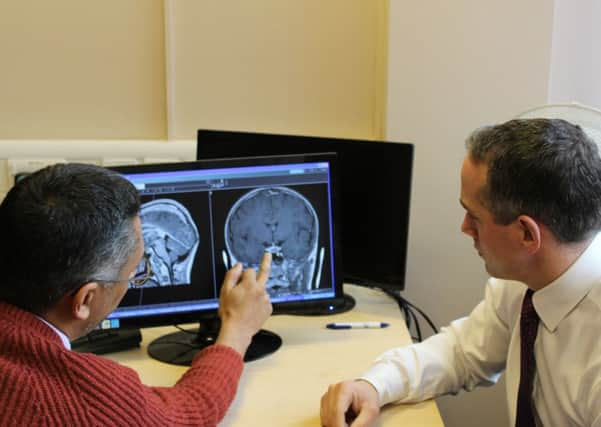Where child needs come first


A Yorkshire hospital is helping children with rare tumours at the base of their brain.
Only around one in a million children get pituitary tumours, so in many cases children with the tumours ended up being treated by surgeons who specialised in the adult condition.
Advertisement
Hide AdAdvertisement
Hide AdAt Sheffield Children’s Hospital, the surgery and endocrine management is carried out by a specialist children’s multi-disciplinary team led by Mr Saurabh Sinha, consultant paediatric neurosurgeon and Professor Paul Dimitri, consultant paediatric endocrinologist.
Saurabh Sinha has been leading the surgical arm of the service since 2009 when it was created.
“Having a specialist service for children is important. The anatomy of children is very different to adults. It is not just smaller,” explains Sinha.
“Adults have a big air cavity that helps with access – it is still bony in a child. The tumours also behave very differently in children.
Advertisement
Hide AdAdvertisement
Hide Ad“By offering a dedicated paediatric service, we are able to offer the best possible care for these children. Prior to 2009 patients were sent to London, where they were seen by an adult neurosurgeon without specific paediatric expertise. Now we have fully-trained specialists in paediatric pituitary and related tumours.
“In conjunction with our Ear Nose and Throat (ENT) colleagues, led by Mr Showkat Mirza, we access these tumours by using a thin rigid camera and other specialist equipment, which was funded by The Children’s Hospital Charity.
“This enables us to use a minimally invasive technique to remove these tumours through the nose and not have to open up the skull to access the pituitary gland.”
Paul Dimitri added: “By offering a full specialist package of paediatric neurosurgery and endocrine care at Sheffield Children’s Hospital, we ensure that children with these tumours can be provided with the highest level of care in the same place.”
Advertisement
Hide AdAdvertisement
Hide AdThe pituitary gland sits underneath the brain and helps to regulate hormones. The pituitary is an important gland in the body and it is often referred to as the “master gland”, because it controls several of the other hormone glands.
The most common problem with the pituitary gland occurs when a benign growth (often referred to as “adenoma” or “tumour”) develops.
This can cause the gland to produce excess hormone, or it can block hormone production, or it can be “non functioning” (hormone production not affected in any way).
Other rarer causes of pituitary disorders can include, for example, traumatic brain injury and pituitary infarction (also known as pituitary apoplexy).
Advertisement
Hide AdAdvertisement
Hide AdWhile tumours are usually non-cancerous, they disrupt the pituitary gland, which can impact mood, the ability to focus, growth and maturation. The tumour can also put pressure on other parts of the brain and can cause headaches, dizziness and problems with vision.
One of Mr Sinha’s recent patients, a nine-year-old from Scotland, is doing well after surgery at Sheffield Children’s Hospital.
The boy’s grandmother said: “The experience from start to finish has been phenomenal and the outcome looks fantastic.
“At Sheffield Children’s Hospital you are not a statistic. It was so clear how much everyone cared. We always felt supported and there is such expertise. They are caring and talented people who make everything look effortless and seamless.
Advertisement
Hide AdAdvertisement
Hide Ad“There is just not enough praise in the world for Mr Sinha, Professor Dimitri, Mr Mirza and the wonderful team around them.
“I would recommend Mr Sinha and his pioneering surgery to anyone in the same position as we were. Sheffield is the place to go.”
Mr Sinha said: “Many of our patients go on to lead a completely normal life. It is wonderful to know you are making a difference.”
For more information about the paediatric pituitary tumour surgery at Sheffield Children’s or the rest of its Neuroendocrine service, contact 0114 271 7118.
For more information on the Children Hospital Charity visit www.tchc.org.uk